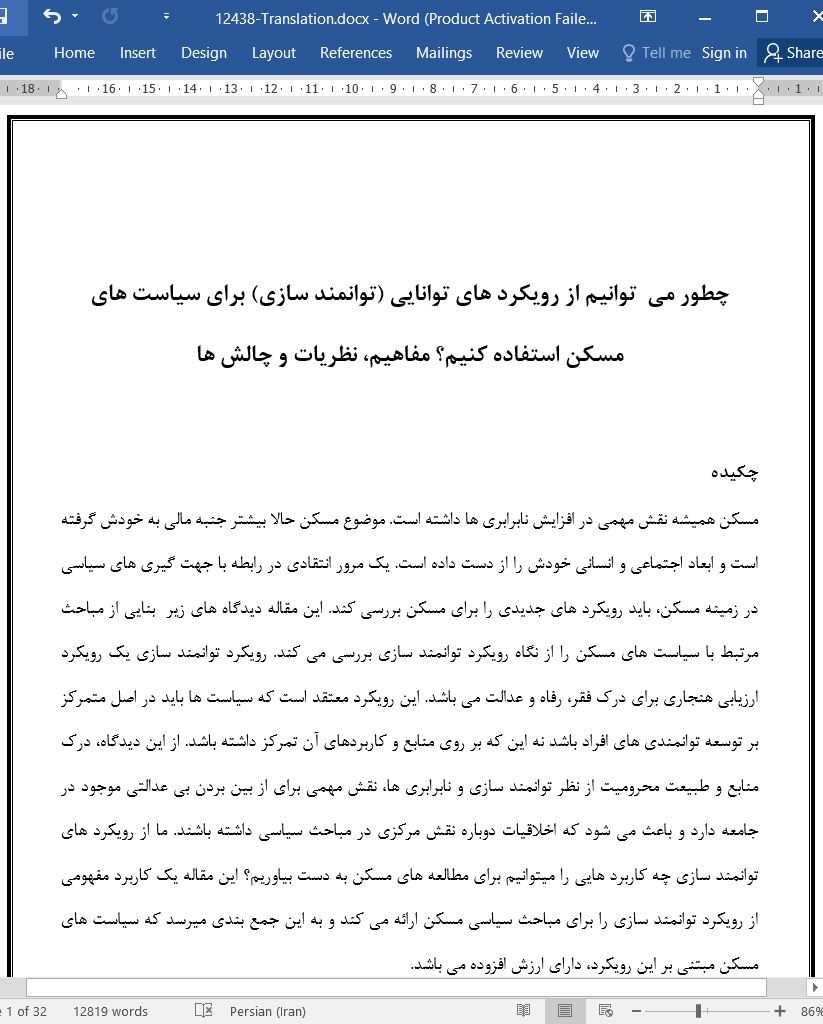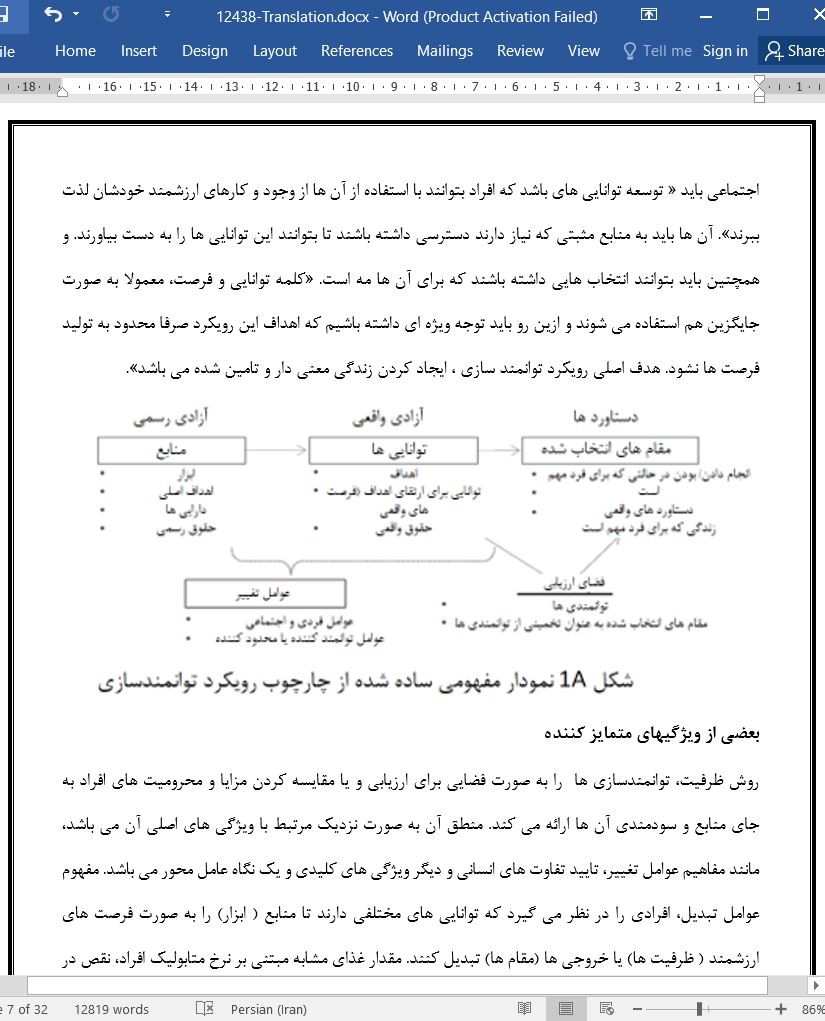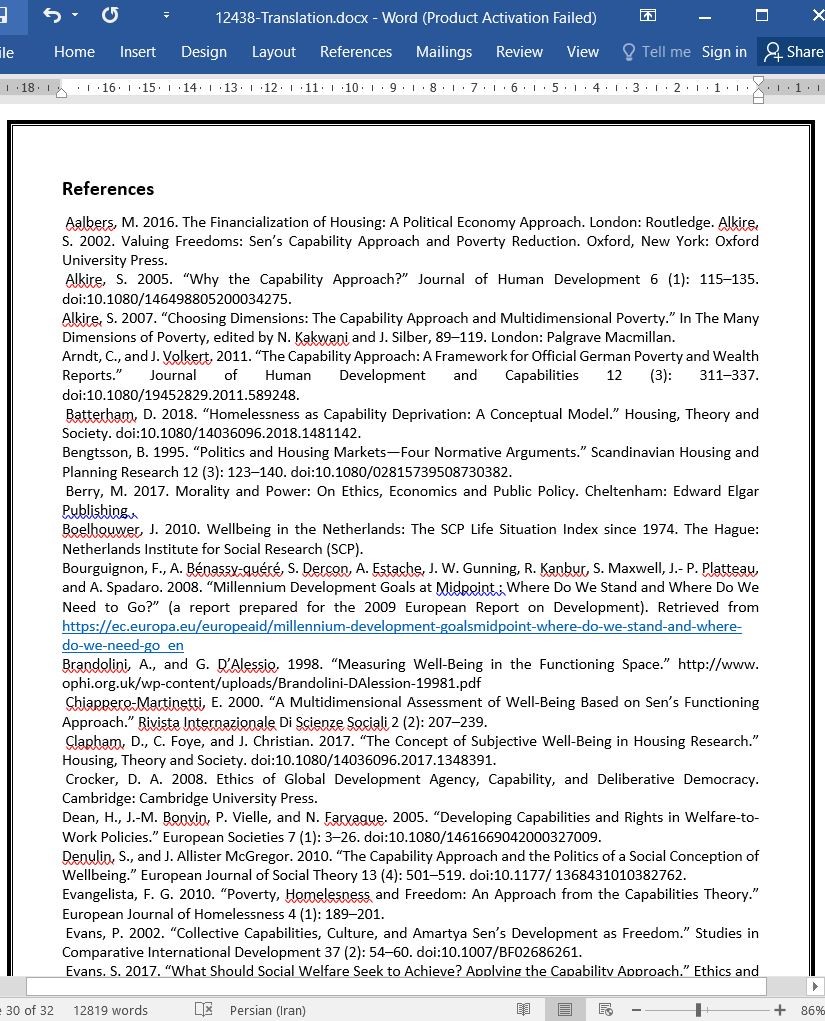
دانلود مقاله چطور می توانیم از رویکرد های توانایی برای سیاست های مسکن استفاده کنیم؟
چکیده
مسکن همیشه نقش مهمی در افزایش نابرابری ها داشته است. موضوع مسکن حالا بیشتر جنبه مالی به خودش گرفته است و ابعاد اجتماعی و انسانی خودش را از دست داده است. یک مرور انتقادی در رابطه با جهت گیری های سیاسی در زمینه مسکن، باید رویکرد های جدیدی را برای مسکن بررسی کند. این مقاله دیدگاه های زیر بنایی از مباحث مرتبط با سیاست های مسکن را از نگاه رویکرد توانمند سازی بررسی می کند. رویکرد توانمند سازی یک رویکرد ارزیابی هنجاری برای درک فقر، رفاه و عدالت می باشد. این رویکرد معتقد است که سیاست ها باید در اصل متمرکز بر توسعه توانمندی های افراد باشد نه این که بر روی منابع و کاربردهای آن تمرکز داشته باشد. از این دیدگاه، درک منابع و طبیعت محرومیت از نظر توانمند سازی و نابرابری ها، نقش مهمی برای از بین بردن بی عدالتی موجود در جامعه دارد و باعث می شود که اخلاقیات دوباره نقش مرکزی در مباحث سیاسی داشته باشند. ما از رویکرد های توانمند سازی چه کاربرد هایی را میتوانیم برای مطالعه های مسکن به دست بیاوریم؟ این مقاله یک کاربرد مفهومی از رویکرد توانمند سازی را برای مباحث سیاسی مسکن ارائه می کند و به این جمع بندی میرسد که سیاست های مسکن مبتنی بر این رویکرد، دارای ارزش افزوده می باشد.
مقدمه
مباحث مرتبط با سیاست های مسکن ابعاد انسانی و اجتماعی خودش را در دهه های اخیر از دست داده است. مسکن حالا بیشتر جنبه مالی به خودش گرفته است (شورای حقوق بشر بین الملل 2017، Aalbers 2016)، و موضوع مسکن را به عنوان یک « کالا، ابزاری برای جمع کردن ثروت و معمولا یک مکان امن برای سرمایه گذاری های مالی» در نظر می گیرد و دیگر عملکرد اجتماعی خودش را از دست داده است. مالکیت خانه در جوامع غربی از دهه 1990 افزایش یافته است و این افزایش به دنبال این باور ایجاد شده که خانه باعث می شود امنیت اقتصادی افراد تضمین شود. تحلیل انتقادی انجام شده توسط پیکتی و گلدهامر (2014) در رابطه با افزایش نابرابری ها در سرمایه و نقش مسکن در این شرایط، نشان دهنده شرایط اخطار برای جهت گیری های سیاسی در زمینه مسکن می باشد. در Global South، موضوع تبدیل شدن جنبه های مسکن به جنبه مالی معمولا باعث از دست رفتن تملک نسبت به خانه ها و جایگزین شدن کردن خانه های لوکس و املاک گران و تجاری به جای کاربردهای معمول شده است. برنامه های مختلف مسکن در بیست سال اخیر امتحان شده است اما این برنامه ها بیشتر برای گروه های متوسط جامعه بوده اند (UN-Habitat 2016). حالا این نیاز وجود دارد که محقق های زمینه مسکن جهت گیری های سیاسی در زمینه مسکن را مرور کرده و سعی کنند رویکرد های جدید مسکن را در واکنش به این چالش ها پیدا کنند.
جمع بندی: چالش ها و مسیر آتی
از دید رویکرد توامند سازی، این مقاله مبنای مباحث سیاست های مسکن را مورد ارزیابی قرار داد. در این مطالعه ما نشان دادیم که یک ارزش افزوده از رویکرد های توامندسازی در مطالعه های مسکن وجود دارد و این نیاز وجود دارد تا دغدغه های غیر مالی و جدا از منابع و بهره وری برای مسکن در نظر گرفته شود تا بتوانیم به جای محدود کردن نگرانی ها و دغدغه ها به موضوعات کمی مانند تعداد واحد ها، کیفیت مسکن و رضایت نسبت به مسکن و قیمت آن، توانمندی های فردی در رابطه با مسکن را در نظر بگیریم. این مقاله چند حوزه احتمالی برای کاربرد های رویکرد توانمندسازی در زمینه مسکن را ارائه کرده است. این موضوع نیازمند تحقیقات بیشتر از محقق های تجربی، نظری و فلسفی می باشد. کاربرد رویکرد توانمندسازی برای مطالعه های مسکن و عملیاتی سازی آن میتواند چالش بر انگیز باشد. اما افزایش تعداد کاربرد ها در زمینه های دیگر، با روش های مختلف باعث شده که امید ما نسبت به آینده بیشتر شود.
در این مقاله من سوالات بسیار زیادی را برای تحقیقات آتی سپرده ام. در میان این سوالات، یکی از سوالات بسیار مهمی که باید بررسی شود، نقش سیاست های مسکن و نهاد های مربوطه در کاهش بی عدالتی و توسعه توانمندی ها ( فرصت های واقعی) برای افراد و توسعه عدالت می باشد. این موضوع مرتبط با تحقق مجدد اخلاقیات در مرکز سیاست های مسکن می باشد. به عنوان مبنایی برای مباحث بیشتر در این زمینه، این مقاله در اصل بر روی ارزیابی فضای تحقیقات رفاهی از نقطه نظر رویکرد توانمند سازی متمرکز می باشد و کاربردهای آن را برای سیاست های مسکن بررسی می کند که در اصل مرتبط با سوال معیار مناسب برای بررسی عدالت می باشد. نقش سیاست های مسکن در رابطه با عدالت و کاربرد های رویکرد توانمند سازی برای این مفاهیم، باید بیشتر بررسی شود.
ABSTRACT
Housing has played a significant role in increasing inequality. It has been financialised and losing its human and social dimensions. A critical review of housing policy directions is needed to explore a new housing approach. This article revisits the underpinning perspectives of housing policy discussions through the lens of the capability approach. The capability approach is a normative evaluative approach to understanding poverty, well-being, and justice. It argues that policy should primarily focus on expanding individuals' capabilities instead of resources and utilities. From its perspective, understanding the sources and nature of capability deprivation and inequity is central to removing existing injustice in our society, and to re-establishing ethics at the centre of policy discussions. What implications for housing studies can we draw from the capability approach? The article presents a conceptual application of the capability approach to housing policy discussions, and concludes that a capability-oriented housing policy framework has an added value.
Introduction
Housing policy discussions have been losing human and social dimensions in recent decades. Housing has increasingly become financialised (UN Human Rights Council 2017; Aalbers 2016) and treated as “a commodity, a means of accumulating wealth and often as security for financial instruments” and disconnected from its social function (UN Human Rights Council 2017, 3). Homeownership has been promoted in Western countries since the 1990s with a belief in its role in ensuring individuals’ economic security. The critical analysis of Piketty and Goldhammer (2014) on the increased inequality in capital and the role of housing in it rings alarm bells for the current housing policy directions. In the Global South, the financialisation of housing has often resulted in evictions and displacements for luxurious residential and high-end commercial real estate (UN Human Rights Council, 4). Various housing programmes have been tried for the last twenty years but benefited only middle-income groups (UN-Habitat 2016). There are increasing calls for housing researchers to review the housing policy directions, and to explore a new housing approach in response to these challenges.
Conclusion: Challenges and the Way Forward
Through the lens of the capability approach, this article re-examined the underpinning notions of housing policy discussions. It revealed an added value of the capability approach to housing studies, and a need for taking into account non-resource and nonutility concerns by placing the focus on multiple capabilities relevant to housing, instead of limiting its concerns to quantity of housing units, physical quality of housing, housing satisfaction, and housing affordability. The article suggested some potential areas of the capability applications in housing studies. This topic requires further inputs from empirical, theoretical as well as philosophical research. The application of the capability approach to housing studies and its operationalization can be challenging. However, an increasing number of applications in other disciplines with various methods and methodologies provide a great promise.
In this article, I have left many important questions for future research. Amongst them, the vital question that should be noted is about the role of housing policy and institutions in reducing injustice and in enlarging capabilities (real opportunities) of people for advancing justice. It is related to re-establishing ethics at the centre of housing policy discussion. As a foundation of the further discussion on this question, this article primarily focused on examining the evaluative space of well-being from the capability approach perspective, and its implications for housing policy, which is fundamentally connected to the question on the proper metric of justice. The role of housing policy with regard to justice and the implications of the capability approach for it need to be further discussed.
چکیده
مقدمه
رویکرد توانمند سازی: یک مقدمه کوتاه
مفاهیم اصلی
بعضی از ویژگیهای متمایز کننده
توانایی ها، رفاه و عدایت
کاربرد هایی برای مطالعه های مرتبط با مسکن
مشکلات رویکرد ارزیابی مبتنی بر منابع
مشکلات رویکرد ارزیابی مبتنی بر بهره وری
نمونه ای از شکاف موجود در ارزیابی منابع و مبتنی بر بهره وری
استفاده از رویکرد توانمندسازی برای مطالعه های مسکن: مقام های انسانی و توانایی های آن ها مرتبط با مسکن
کارکرد های مرتبط با مسکن
توانایی های مرتبط با مسکن
چند حوزه احتمالی برای کاربرد رویکرد توانمندسازی در تحقیقات مرتبط با مسکن
شناسایی کردن گروه های هدف در سیاست های مسکن
ارزیابی کردن عملکرد سیاست های مسکن
طراحی برنامه ها و سیاست های مسکن
توسعه مسکن به صورت مشارکتی
دیگر موارد
جمع بندی: چالش ها و مسیر آتی
منابع
ABSTRACT
Introduction
Capability Approach: A Brief Introduction
Key Concepts
Some Distinctive Features
Capabilities, Well-being and Justice
Implications for Housing Studies
Problems of the Resource-focused Evaluative Approach
Problems of the Utility-focused Evaluative Approach
An Example of Gaps in Resource and Utility-focused Evaluation
Applying the Capability Approach to Housing Studies: Functionings and Capabilities Relevant to Housing
Functionings Relevant to Housing
Capabilities Relevant to Housing
Some Possible Areas of the Capability Application in Housing Research
Identifying Target Groups of Housing Policy
Evaluation of Housing Policy Performance
Housing Policy and Programme Design
Participatory Housing Development
Others
Conclusion: Challenges and the Way Forward
References
- اصل مقاله انگلیسی با فرمت ورد (word) با قابلیت ویرایش
- ترجمه فارسی مقاله با فرمت ورد (word) با قابلیت ویرایش، بدون آرم سایت ای ترجمه
- ترجمه فارسی مقاله با فرمت pdf، بدون آرم سایت ای ترجمه



